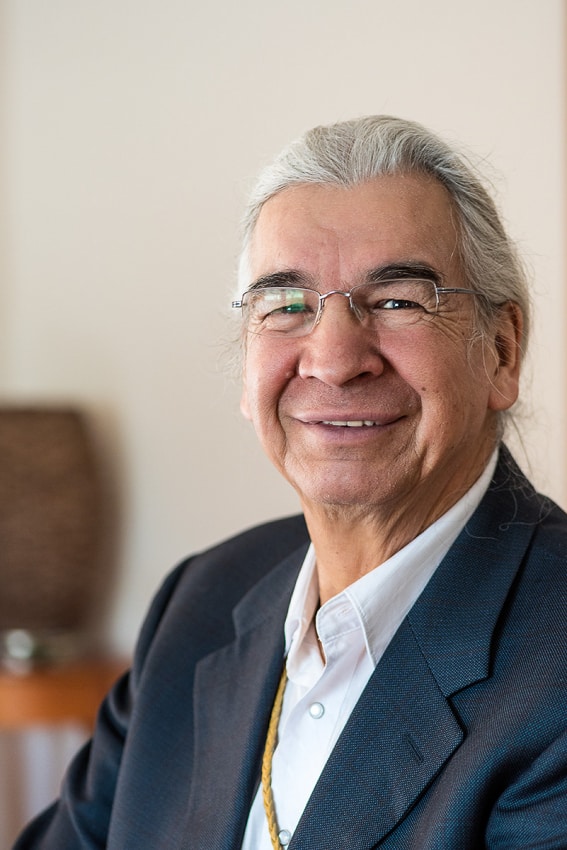
Throughout Joseph Naytowhow’s lengthy career as a Cree musician, actor, storyteller and educator, he has accumulated a range of skills and knowledge that he is applying while in the Indigenous Knowledge Keeper position.
Naytowhow, a renowned interdisciplinary artist from the Sturgeon Lake First Nations Band, says the proposal to fill the position in the
2019-20 academic year appealed to him because of his history with the campus community and his time as a student before graduating from the College of Education.
Naytowhow feels like he has reached a balanced and healthy point in his life, and he is ready to be a helper to people.
“I feel like I can provide that guidance that students need individually or collectively,” Naytowhow said. “I can help them through what I’ve gone through because I have a good story to tell and it’s a story of healing, childhood struggle and survival.”
The position, first titled “Elder-in-Residence,” was established by the University of Saskatchewan Students’ Union in January, with two-spirit Métis filmmaker Elder Marjorie Beaucage filling the role for its first term.
Naytowhow says the life experiences he relies on to fill the Indigenous Knowledge Keeper position are both the good and the bad, which include his experiences as a survivor of Canada’s residential school system.
“It seems like that’s one of the areas that I think hasn’t really been known by Canadians in general, including in the university, so I’ve drawn on that as well even though it’s a typical story,” Naytowhow said.
“Shared sparingly, as I feel it’s a difficult experience and not too many people know that story, but I know it well.”
The logo for USSU’s strategic goals for the year, “The Path Forward,” is a medicine wheel featuring the colours used ceremonially in Naytowhow’s community. He requested permission from his lodge to use the colours to help represent the USSU’s goals and the university as a whole.
“Those colours are actually quite suitable because they represent the four directions which are all the things being studied at the university,” Naytowhow said. “Imagine if everyone in the whole university in all their different faculties made a really big circle, they would all fit in one of those directions.”
This year, Naytowhow has co-ordinated pipe ceremonies and attended University Council meetings. He has also taken part in discussions on missing and murdered Indigenous women in Canada. Naytowhow says it can be difficult to raise awareness about the violence in Indigenous communities because this issue “has its roots in the trauma of this country.”
“It was a challenging discussion but a good one to have and it was more spontaneous,” Naythowhow said. “Sometimes it’s trickier when it’s coming right from your truth — those are the hardest stories to share.”
Naytowhow admits that helping Indigenous and non-Indigenous students through personal troubles can be a challenge, but prayer, smudging and certain medicines help “calm the mind” and bring people clarity.
“I can take them to ceremonies where they can bring themselves back to balance in the way I was raised and you know it works,” Naytowhow said.
Naytowhow says it is great to see Indigenization being taken seriously and to be a part of decolonizing academia. His plans for the new year include offering drop-in services to students and organizing more presentations.
“We need some connection to the Indigenous world because of the [historical] relationship that we have here,” Naytowhow said. “A way to enter into that spiritual world or spirit connection is through something as simple as acknowledging something greater than ourselves through a smudge.”
—
Noah Callaghan/ Staff Writer
Photo: Supplied by James Page
Leave a Reply